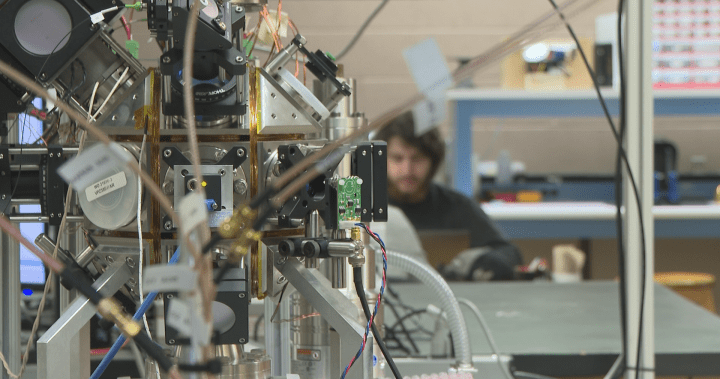Researchers at the University of New Brunswick have developed a project involving a cloud of a hundred million rubidium atoms, which they have cooled to extremely low temperatures. By cooling the atoms, they are able to behave like waves, which allows researchers to measure interference with the waves and determine the gravitational field. This technology is intended to help with navigation in areas where GPS is not effective, such as underground or underwater. The project, which is a collaboration with groups in Ontario, Australia, and Amsterdam, recently received nearly $3 million in funding from Canada’s Department of National Defence.
Philippe Hébert, the director general of innovation with the Department of National Defence, highlighted the importance of precision navigation and timing for the military. This technology enables precision munitions to be deployed and allows the Canadian forces to track the movement of every unit. In addition to military applications, this project also has commercial potential, particularly for civil engineers who need to measure distances from sea level. The project also provides valuable research experience for university students, allowing them to develop specialized skills that will be useful in their future careers.
One of the master’s students involved in the project, Kamal Shalaby, has been working on developing circuits for the lasers that keep the atoms cold since his undergraduate studies. He emphasized the unique and exciting nature of the project, particularly in the field of physics. The project has provided him with valuable experience in working with experts in the field and developing cutting-edge technology. This hands-on experience will be beneficial for his future career, as Canada aims to improve quantum expertise nationally as part of a quantum strategy.
The project at the University of New Brunswick has not only provided students with valuable research experience but also contributes to Canada’s efforts to enhance quantum expertise. By training students in the early stages of their careers, the university is helping to build a talent pool that can contribute to the industry or academia. This project has enabled students like Kamal Shalaby to gain valuable skills and knowledge while working with experts in the field. Despite being a smaller institute, UNB has a lot to offer in terms of research opportunities and cutting-edge technology.
The cloud of rubidium atoms being used in the project is the coldest matter in the Maritimes, according to lead researcher Brynle Barrett. By studying the behavior of these cold atoms, researchers can measure interference with waves and determine the gravitational field. This technology has potential applications in navigation where GPS is ineffective, such as in underground or underwater environments. The funding received from Canada’s Department of National Defence reflects a commitment to developing innovative ideas with military applications in mind. This project not only has military and commercial relevance but also provides valuable research experience for students and contributes to the national effort to enhance quantum expertise.













